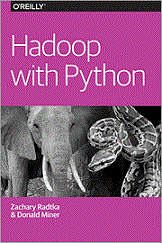
|
FreeComputerBooks.com
Links to Free Computer, Mathematics, Technical Books all over the World
|
|
- Title: Hadoop with Python
- Author(s) Zachary Radtka and Donald Miner
- Publisher: O'Reilly Media Media, Inc. (2016)
- Paperback: N/A
- eBook: HTML, PDF, ePub, mobi (Kindle)
- Language: English
- ISBN-10/ASIN: N/A
- ISBN-13: 978-1-491-94227-7
- Share This:

|
Hadoop is mostly written in Java, but that doesn't exclude the use of other programming languages with this distributed storage and processing framework, particularly Python. With this concise book, you'll learn how to use Python with the Hadoop Distributed File System (HDFS), MapReduce, the Apache Pig platform and Pig Latin script, and the Apache Spark cluster-computing framework.
This book takes you through the basic concepts behind Hadoop, MapReduce, Pig, and Spark. Then, through multiple examples and use cases, you'll learn how to work with these technologies by applying various Python tools.
- Use the Python library Snakebite to access HDFS programmatically from within Python applications
- Write MapReduce jobs in Python with mrjob, the Python MapReduce library
- Extend Pig Latin with user-defined functions (UDFs) in Python
- Use the Spark Python API (PySpark) to write Spark programs with Python
- Learn how to use the Luigi Python workflow scheduler to manage MapReduce jobs and Pig scripts
- Zachary Radtka, a platform engineer at Miner & Kasch, has extensive experience creating custom analytics that run on petabyte-scale data sets.
- Donald Miner is an avid user of Apache Hadoop and a practitioner of data science. He serves as Chief Technology Officer at ClearEdge IT Solutions, a company that provides Big Data professional services.

- Hadoop with Python (Zachary Radtka, et al)
- The Mirror Site (1) - PDF
- The Mirror Site (2) - PDF
- Video Lecture - YouTube (3 huors)
-
 Hadoop Illuminated (Mark Kerzner, et al)
Hadoop Illuminated (Mark Kerzner, et al)
This book aims to make Hadoop knowledge accessible to a wider audience, not just to the highly technical. It book introduces you to Hadoop and to concepts such as 'MapReduce', etc., which will help you get acquainted with the technology.
-
 Hadoop for Windows Succinctly (Dave Vickers)
Hadoop for Windows Succinctly (Dave Vickers)
This book provides a thorough guide to using Hadoop directly on Windows operating systems. From a conceptual overview to practical examples, Hadoop for Windows Succinctly is a valuable resource for developers.
-
 Hadoop Succinctly (Elton Stoneman)
Hadoop Succinctly (Elton Stoneman)
This booky explains how Hadoop works, what goes on in the cluster, demonstrates how to move data in and out of Hadoop, and how to query it efficiently. It also walks through a Java MapReduce example, illustrates it in Python and .NET, too.
-
 Big Data Analytics with Hadoop 3 (Sridhar Alla)
Big Data Analytics with Hadoop 3 (Sridhar Alla)
This book shows you how to combine Hadoop with a host of other big data tools to build powerful analytics solutions, by providing insights into the software as well as its benefits with the help of practical examples.
-
 Understanding Big Data: Analytics for Hadoop and Streaming Data
Understanding Big Data: Analytics for Hadoop and Streaming Data
In this book, the three defining characteristics of Big Data - volume, variety, and velocity, are discussed. Industry use cases are also included in this practical guide, to deliver a robust, secure, highly available, enterprise-class Big Data platform.
-
 Knowledge Graphs and Big Data Processing (Valentina Janev, et al)
Knowledge Graphs and Big Data Processing (Valentina Janev, et al)
Each chapter in this book addresses some pertinent aspect of the data processing chain, with a specific focus on understanding Enterprise Knowledge Graphs, Semantic Big Data Architectures, and Smart Data Analytics solutions.
-
 Big Data in Context: Legal, Social and Technological Insights
Big Data in Context: Legal, Social and Technological Insights
This book sheds new light on a selection of big data scenarios from an interdisciplinary perspective. it provides a comprehensive overview of and introduction to the emerging challenges regarding big data.
-
 Modelling and Simulation for Big Data Applications
Modelling and Simulation for Big Data Applications
Long considered important pillars of the scientific method, Modelling and Simulation have evolved from traditional discrete numerical methods to complex data-intensive continuous analytical optimisations.






